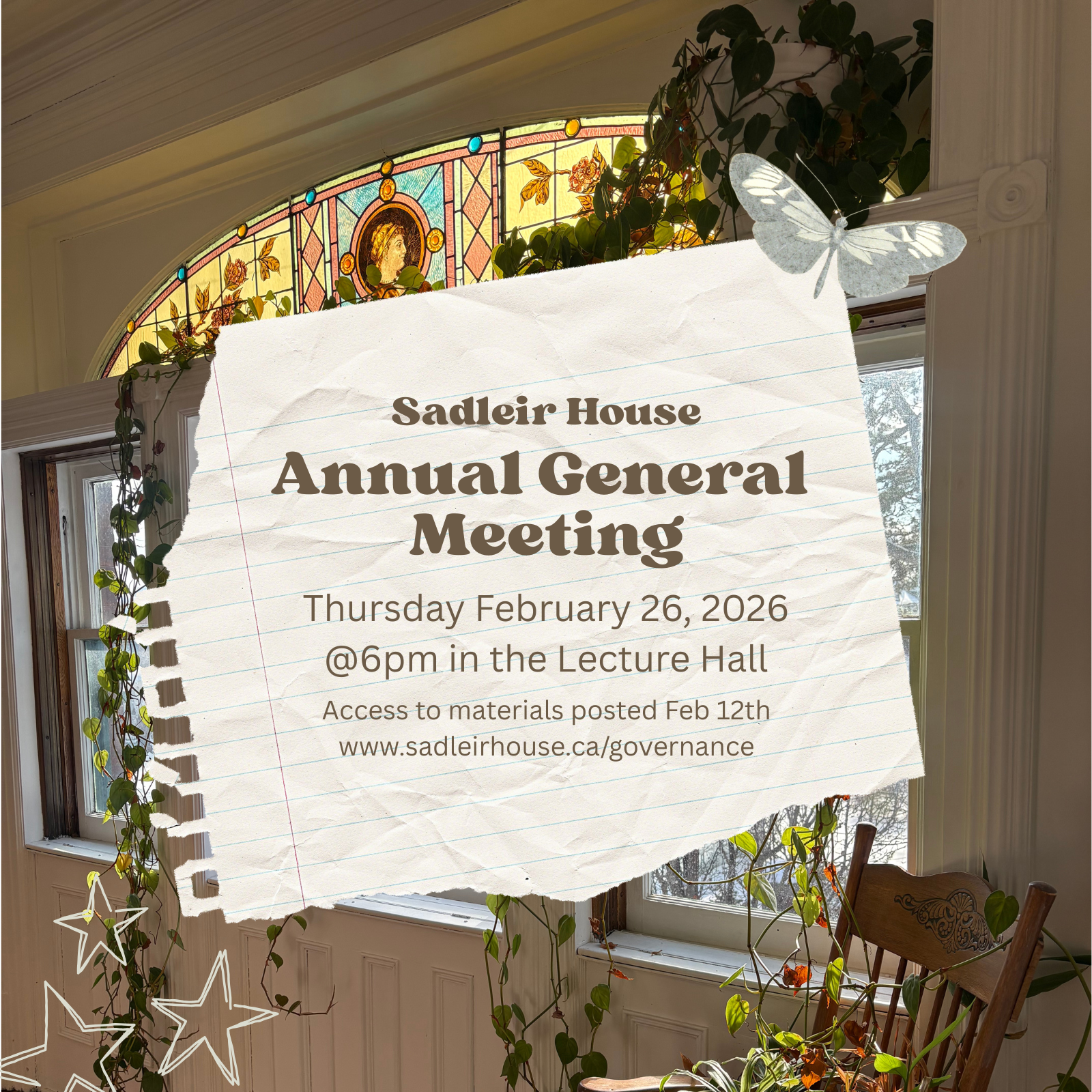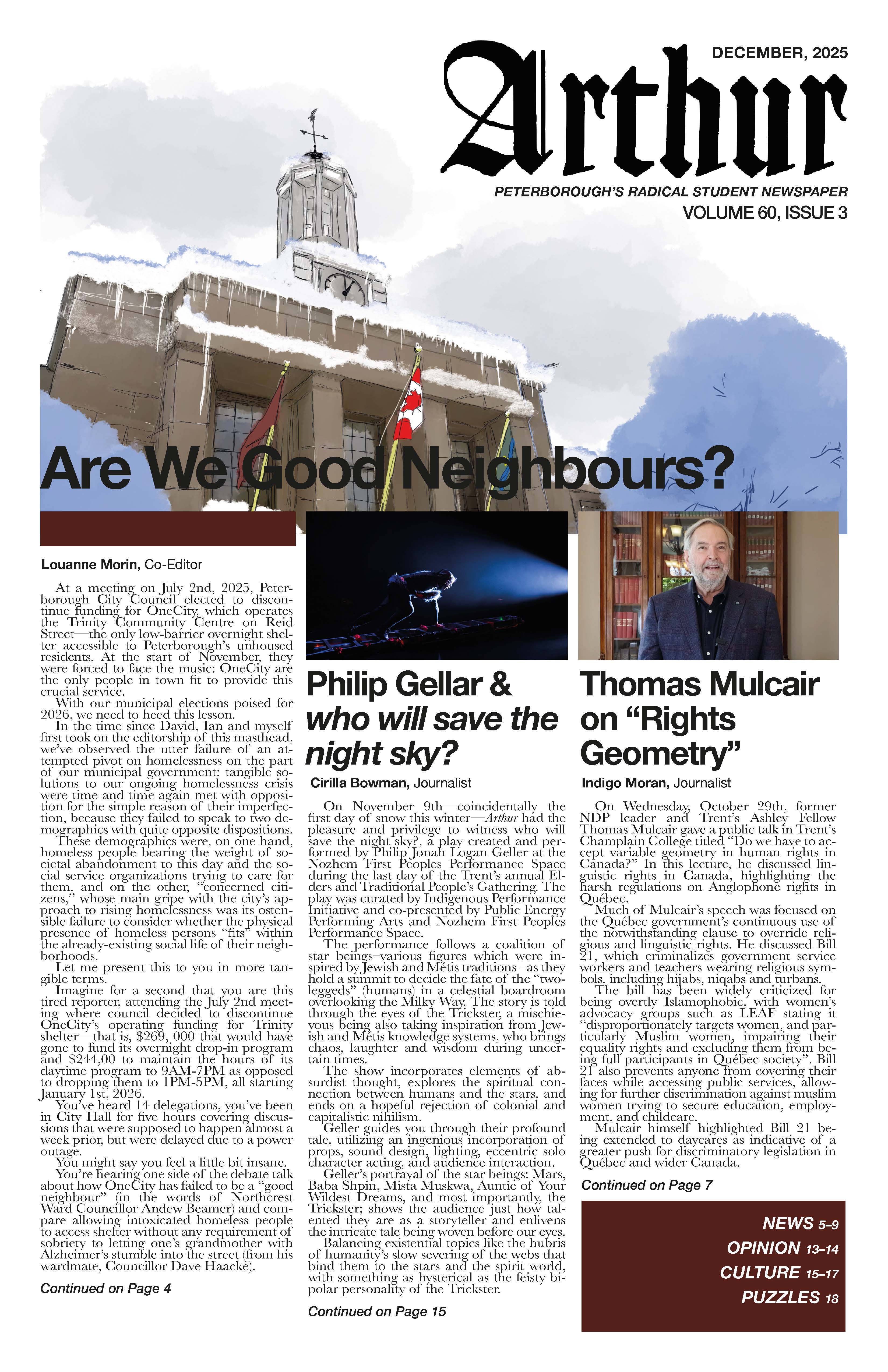I recently read Kari Boyd’s article in the online Arthur titled, “Political expression in an entitled generation”. This paper is a response to that one; I recommend you read her piece before reading mine.
In this paper I will be raising objections to Kari’s arguments, as well as putting forth an alternative viewpoint concerning the problems on campus that she raises which I believe to better reflect the facts.
In her article, Kari does three main things: criticize Trump supporters at Trent University, scold the Trent University Administration, and encourage the victims of both that she, and others, are there for them. Kari’s main argument is that Trump supporters at Trent University are using freedom of speech and freedom of political expression to justify their actions on campus. Meanwhile those actions include harassment, creating terror, disrupting class, and making people (especially students) fearful at Trent.
Firstly, I want to make clear that in the cases where there is obvious harassment, terrorizing, and fear-mongering, I agree with Kari: those cases should be stopped. However, she seems to take issue with more than just these extreme cases, and it is this that I object to.
Before I begin, Kari says that Trent students who claim to be Trump supporters actually are not because, “you can’t truly support a political party if you aren’t able to actually vote for them”. I find this implausible, since it implies that one cannot truly oppose a political party unless she is able to actually vote against it, but this is counter-intuitive. Furthermore, even if we concede that Canadian citizens cannot vote for Trump or the Republicans, surely they can support the ideals of the man and/or the party, and this ought to make one worthy of the name “supporter”. This is just to say that we ought to recognize Trump supporters as people who actually do exist on campus.
Moving forward, Kari goes on to argue that some Trump supporters are trying to use their freedom of speech to justify their actions on campus, but that this is impossible because there are limitations to this freedom. Kari’s article claims that the following is a quote from the Charter, “freedom of expression in Canada is not absolute; rather, it can be limited to promote other values that are considered to be of greater importance”. While this is true, it is not in the Canadian Charter, but taken from a piece written by Julian Walker in 2013, published by the Canadian Library of Parliament.
Omitting this minor detail, Kari’s main argument is that actions are not the same as speech, therefore the actions that Trump supporters are making on campus are indefensible, as far as the Charter is concerned. But actually the Charter does defend “expression” at 2b, as well as “peaceful assembly” at 2c, and “freedom of association” at 2d. Indeed, this goes beyond mere speech and into the realm of action.
Of course, I agree with Kari that anyone who shouts racist slurs in public spaces on Trent’s campus or promotes sexual assault is no longer merely using their freedom of expression, and such actions should be stopped. However, Kari provides a hypothetical example (eerily similar to an actual event that occurred on Trent’s campus) of a person standing outside a classroom with a Trump flag. This is exactly the kind of action which Kari claims is not protected by the Charter, but this seems to me to fit quite well with 2b, 2c, and 2d. On top of this, supporting a political party or leader of a party with a flag and a hat is a very different thing from shouting racist slurs or promoting sexual assault.
Kari then moves on to chastise the Trent Administration. She quotes a statement that Trent University released, “… such freedom does not permit everything, but it does incorporate the freedom of discussion and debate for students and faculty on complex and sometimes difficult issues. The university urges all involved in such debate to pursue it in a respectful and responsible manner”. Kari thinks that such a statement confuses harassment with debate, and argues that what some of the Trump supporters are doing on campus is not mere debate, but actually harassment, and therefore the Trent Administration is helping the problem by permitting such actions.
The trouble is that the above quote is from a statement released by the Office of the President back in January 2015 in response to events that occurred during Divestment Week of the same month and year. The problems that Kari has with Trump supporters and the statement released by the Trent Administration almost two years ago that she quotes are not actually related.
Now that I have outlined some of my concerns with Kari’s paper, I put forth an alternative opinion: you should have the right to be wrong. This does not mean that in the clear-cut cases when someone is obviously demonstrating malicious and illegal intent that we should stand back and allow them to. Rather, I simply mean that Trent students should be permitted to express their views on campus and support whatever political party and its ideals that they want, so long as they are not harming others – even if you think that those ideals are wrong. The simple truth is that you yourself may be wrong, and to silence someone else before they are able to make clear what it is exactly that they are supporting is to assume that you are so undeniably correct that their opinion is not even worth being heard.
I do not see why Kari would want to disagree with this. After all, we both agree that the extreme cases mentioned above (clear-cut racism, promotion of sexual violence, harassment, etc.) are bad and should be stopped, so I doubt that she would be opposed to letting people hold a flag outside of a class, now that she can see that such an action is protected by the Charter.
However, Kari may still want to argue that holding a Trump flag outside a classroom actually does qualify as harassment – but how could this be? I think that this objection is only plausible on an intuitive level. For instance, suppose that a student stands outside of a classroom holding a Bernie Sanders flag. Are we to call this harassment too? Intuition wavers.
Harassment (as a legal offence) is defined as making unwelcome remarks or jokes about one’s race, age, religion, or any of the 11 grounds of discrimination. While I certainly do not want to play the definitions game, this one captures at least one important element of harassment. But are we to say that both the Trump supporter and the Sanders supporter are demonstrating harassment? To bite the bullet is to say that virtually any kind of public support for any party is harassment – and this is a very difficult position to maintain.
Yet, Kari may want to object on the grounds that Bernie Sanders is not racist, sexist, ableist, etc. whereas Donald Trump is, and therefore by publicly supporting Trump one is necessarily publicly supporting all of the other nasty things along with him.
This is a very serious objection but one that, if true, might be a really good reason to stop someone from holding a Trump flag outside of a classroom. In that case, why does Kari not mention it in her article? She instead argues that holding a flag is an action, and actions are not protected by the Charter, and therefore holding a flag is not protected by the Charter. Furthermore, even if Kari does not include this objection for other considerations (perhaps because it would make her paper too long), it is still not an easily defensible position. The case of whether Donald Trump actually is racist (or any of the other points mentioned) is under-determined.
Moreover, and more importantly, to assume that somebody who supports Trump also necessarily supports the nasty things that he himself may or may not support is a wildly unfair assumption. Therefore to silence a group or individual who supports Trump (by, for instance, not allowing them to hold a flag outside of a classroom) when it is unclear whether they support all of the nasty things mentioned (like racism) is to assume far too much. It assumes that the under-determined case is actually an obvious one; it assumes infallibility.
Ultimately I agree with Kari that people who publicly demonstrate racism, promote sexual violence, or terrorize and harass people at Trent should not be permitted to do so. However, I disagree that all Trump supporters on campus fit the bill. Despite what opinions many of us here at Trent may hold towards Donald Trump, his Republican regime, or his disciples found here at Trent University, we ought to remember our own fallibility and realize that we should all have the right to be wrong.





.png)












.jpg)








.png)